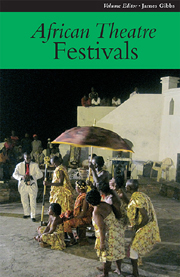Book contents
- Frontmatter
- Contents
- Notes on Contributors
- Obituary of Efo Kodjo Mawugbe
- Introduction by James Gibbs
- Festivals as a Strategy for the Development of Theatre in Zimbabwe 1980–2010
- The Legacy of Festac '77
- Festac, Month by Month & Soyinka's Involvement
- The Dakar Festivals of 1966 & 2010
- African Renaissance between Rhetoric 30 & the Aesthetics of Extravagance FESMAN 2010 – Entrapped in Textuality
- Theatre Programme for FESMAN & Commentary
- The Pan-African Historical Theatre Festival (PANAFEST) in Ghana, 1992–2010
- PANAFEST through the Headlines
- International Festivals & Transnational Theatre Circuits in Egypt, 1988–2010
- The Jos Theatre Festival 2004–2011
- The Grahamstown Festival & the Making of a Dramatist An interview with ANDREW BUCKLAND
- Playscript
- Book Reviews
Festac, Month by Month & Soyinka's Involvement
Published online by Cambridge University Press: 05 May 2013
- Frontmatter
- Contents
- Notes on Contributors
- Obituary of Efo Kodjo Mawugbe
- Introduction by James Gibbs
- Festivals as a Strategy for the Development of Theatre in Zimbabwe 1980–2010
- The Legacy of Festac '77
- Festac, Month by Month & Soyinka's Involvement
- The Dakar Festivals of 1966 & 2010
- African Renaissance between Rhetoric 30 & the Aesthetics of Extravagance FESMAN 2010 – Entrapped in Textuality
- Theatre Programme for FESMAN & Commentary
- The Pan-African Historical Theatre Festival (PANAFEST) in Ghana, 1992–2010
- PANAFEST through the Headlines
- International Festivals & Transnational Theatre Circuits in Egypt, 1988–2010
- The Jos Theatre Festival 2004–2011
- The Grahamstown Festival & the Making of a Dramatist An interview with ANDREW BUCKLAND
- Playscript
- Book Reviews
Summary
One way in to appreciate the issues raised and impact of Festac ‘77 is through coverage in the Nigerian press, and the references that Wole Soyinka has subsequently made to the festival. In the paragraphs and pages below, significant elements are identified and relevant references are listed. From them it emerges that, in the run-up to Festac, there were delays and uncertainties. There was, for example, a concern about what Festac was celebrating, and how this related to ideas of, for example, progress and ‘primitivity’. Beside this discussion there was a division that can be polarised in the positions taken by Leopold Senghor and Obafemi Awolowo, and into which can be read the influence of different experiences of colonialism and of the grounds on which the anti-colonial struggle was being waged. As the opening of Festival approached, rifts developed or widened. There were tensions between Nigeria and countries that had taken different political routes, such as Guinea, and there was concern about who should contribute under the banner of the ‘Black and African World’. While international negotiations on these topics were taking place, anxiety was expressed about domestic issues such as the marginalisation of creative Nigerians. In the middle of this, and having just published a prison memoir in which he ‘named names’, Wole Soyinka returned to Nigeria from self-exile.
- Type
- Chapter
- Information
- African Theatre 11: Festivals , pp. 22 - 27Publisher: Boydell & BrewerPrint publication year: 2012

